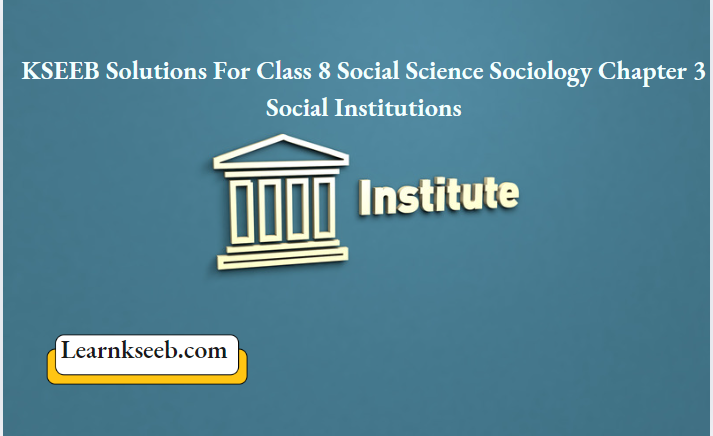KSEEB Solutions Class 8 Sociology Chapter 3 Social Institutions Points To Remember
Social institutions fulfil the social needs of human beings. The social institution is that whole of roles, status, moral values and functions catering to the social needs of human beings. Since the social rules and customs remain in operation, social institutions are born. According to ‘Summer and Keller, “Like living beings that have organs and cells, societies also have customs and institutions”.
Summer also says “A social institution is a permanent structure that fulfils the desires of human beings”. According to Maciver and Page, “Social Institutions are the structure devised to fulfil the desires of a particular social group”. Social institutions are found in all societies. They are as old as human civilisation. Social institutions fulfil the basic needs of human beings like shelter, food, sexual desire, procreation and personality development.
Read and Learn More KSEEB Solutions for Class 8 Social Science
Social institutions are the medium of transferring cultural aspects like knowledge, customs, values and others from generation to generation. Hence, social institutions are important for social life. Social institutions fulfil the basic needs of human beings and also regulate their behaviour. The social institutions assign roles to their members based on their age and other yardsticks. Family assigns relationships based on age. Similarly, social institutions assign roles to members by defining their relationships.
Important Questions For KSEEB Class 8 Sociology Chapter 3
The main role of the family is to nourish its members. The elders like grandparents take care of the babies with caution till they become grown-ups. The family also provides nursing for the sick member or the weak elder member. The procreation of children, their upbringing, and nourishment take place within the family. Marriage directs the other relationships in the family. Religion is one of the main mediums of socialisation. It aids the spread of values like truthfulness, patience, peace, sacrifice and others through various customs and rituals.
Truthfulness, honesty and non-violence are some of the religious values that aid social unity. Religion aids in the preservation of values like truthfulness, honesty, and non-violence. Religion is one of the major means of achieving social control. It controls human life through God and spiritual concepts. Religion guides its members to be disciplined and civilised. There is a need to understand this function of religion and stop hating other religions.

Kseeb Solutions For Class 8 Sociology Chapter 3 Pdf
Social Institutions Exercises
Fill in the blanks with a suitable answer:
- Social institutions fulfil the social needs of human beings.
- Family is a Social Institution
- Social institutions are a Medium of cultural transfer.
- Religion aids in the spread of values.
Social Institutions Answer the following:
Question 1. What is a social institution?
Answer: “A social institution is a permanent structure that fulfils the desires of human beings”.
Question 2. Explain the functions of the family.
Answer:
Nourishment of the members: The main role of the family is to nourish its members. The elders like grandparents take care of the babies with caution till they become grownups. The family also provides nursing for the sick member or the weak elder member.
Security and Socialisation: The family educates the children about interacting with society through socialisation. It also provides= social security to the members. It mainly provides skills and nourishment needed for the younger members to become part of society as adults.
Class 8 Sociology Social Institutions KSEEB Notes
Question 3. What are the features of Social institutions?
Answer:
The features of Social institutions are:
Universal
Social Institutions have Rules
Social Institutions fulfil the basic needs
Written and unwritten rules and regulations
Interconnected relationship
Question 4. What are the types of Social institutions?
Answer: The state, family, marriage, and court of law are a few examples of social institutions.
Social Institutions Answer The Following In Four-Five Sentences :
Question 1. Explain the relationship between social institutions and society.
Answer: The social institutions in a given society remain interconnected. Ina traditional society, the family took care of bringing up a child, whereas, in modern society, the school shares the role of bringing up a child. Children who come from different families undergo socialisation in school. The social institutions remain interconnected and complement each other.
Kseeb Solutions Class 8 Sociology Chapter 3 Notes
Question 2. Explain the ideals of religion as a social institution.
Answer:
Socialisation: Religion is one of the main mediums of socialisation. It aids the spread of values like truthfulness, patience, peace, sacrifice and others through various customs and rituals.
Social Unity: Religion fosters unity. By employing symbols and customs, religion creates unity among the members.
Protection of values: Religion aids in the preservation of values like truthfulness, honesty, and non-violence.
Social control: Religion guides its members to be disciplined and civilised. There is a need
Question 3. Explain the functions of the family as a social institution.
Answer:
Nourishment of the members: The main According to ‘Summer and Keller, “Like living to understand this function of religion and stop hating other religions role of the family is to nourish its members. The elders like grandparents take care of the babies with caution till they become grownups. The family also provides nursing for the sick member or the weak elder member.
Security and Socialisation: The family educates the children about interacting with society through socialisation. It also provides social security to the members. It mainly provides skills and nourishment needed for the younger members to become part of society as adults.
KSEEB Class 8 Sociology Chapter 3 Questions And Answers
Question 4. Write a note on Marriage.
Answer:
Social Sanction: Marriage is an important social institution. It provides social sanction for a man and woman to live together. Marriage provides entry to family life. It allows the couple to stay together and lead a life of religious, economic and cultural life. Marriage is as old as human civilization. It has also undergone various changes too.
The base for the Family: Marriage is the base of the family. The procreation of children, their upbringing, and nourishment take place within the family. Marriage directs the other relationships in the family. Marriage often creates unity. Marriage brings together people from different social backgrounds and fosters unity.
Social Institutions Additional Questions And Answers
Answer the following questions in a sentence or two sentences each:
Question 1. What is a social institution according to ‘Summer and Keller’?
Answer: According to Summar and Keller, “Like living beings that have organs and cells, societies also have customs and institutions”.
Question 2. What is social institution according to Summer?
Answer: Summer also says “A social institution is a permanent structure that fulfils the desires of human beings”.
Question 3. What is a social institution according to Maciver and Page?
Answer: According to Maciver and Page, “Social Institutions are the structure devised to fulfil the desires of a particular social group”.
Question 4. Which are the values spread by Socialisation?
Answer: Socialisation aids the spread of values like truthfulness, patience, peace, sacrifice and others through various customs and rituals.
Social Institutions Answer the following in four-five sentences:
Question 1. Social institutions are Universal. Justify.
Answer: Social institutions are found in all societies. They are as old as human civilisation. Irrespective of time and space, social institutions are present in all human societies. Family, marriage and school have been part of human societies with necessary changes.
Question 2. The rules of the social institutions control society. Justify.
Answer: The rules of the social institutions regulate the behaviour of the members. The members who violate the rules are prohibited from participating. Social institutions direct their members to perform roles as per the rules strictly. In families, the role of elders and younger ones are fixed as per the rules framed by the individual
Question 3. How do Social Institutions fulfil basic needs?
Answer: Social institutions fulfil the basic needs of human beings like shelter, food, sexual desire, procreation and personality development. Various social institutions work in coordination to fulfil these needs
Kseeb Class 8 Social Science Sociology Chapter 3 Exercise Answers
Question 4. Explain the importance of Social Institutions
Answer:
Medium of Culture: Social institutions are the medium of transferring cultural aspects like knowledge, customs, values and others from generation to generation. Hence, social institutions are important for social life.
Fulfil the needs of the members: Social institutions fulfil the basic needs of human beings and also regulate their behaviour.
Define and regulate the behaviour of members: The social institutions prescribe and define good and bad behaviours. Schools define our way of dressing and other behaviours. The school corrects our bad behaviour by various means like punishment, reprimands and rustication. If the desired correction is not achieved, then the school resorts to a legal course of action.
Social Institutions provide roles to individuals: The social institutions assign roles to their members based on their age and other yardsticks. Family assigns relationships based on age. Similarly, social institutions assign roles to members by defining their relationships.
Question 5. Why are social institutions important for social life?
Answer: Rural societies have a primary relationship. One can notice friendship, love and kinship among individuals here. Family influences most of social life. Joint families are another major feature of Indian rural societies.
